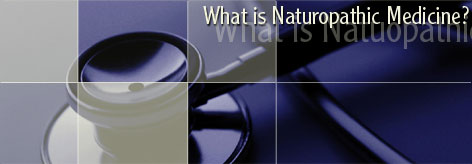"Thank-you for considering naturopathic medicine as part
of your healthcare. I view patient-practitioner
relationships with a deep sense of responsibility. A major
part of that responsibility is to help you understand and
plan for your health. I strive to give each individual the
best quality care in every respect. To ensure this level
of care I am constantly updating my knowledge and skills.
Please
take the time to read the following information as it will
help you better prepare for your visit. "
Naturopathic practice blends centuries-old natural,
nontoxic therapies with advances in the science of health
and human systems, covering all aspects of family health
from prenatal to geriatric care.
Conventional (mainstream) or allopathic medicine, as it is
sometimes referred to, generally treats symptoms with
drugs. Allopathic medicine attempts to create a force
opposite to the symptom. For example, a runny nose might
be treated with a drug to dry the sinuses.
Natural
medicine concentrates on the whole-patient wellness,
centers around the patient and emphasizes prevention and
self-care. Naturopathic medicine attempts to find the
underlying cause of the patient's condition rather than
focusing on symptomatic treatment. For example, a runny
nose might be caused by a food allergy or environmental
factor.
What Are Naturopathic Treatments? These are the major therapies used and
taught in Naturopathic medical schools.
Ayurvedic Medicine - Some Naturopathic Physicians have a specialty in
Ayurveda (the medicine of India), using pulse diagnosis,
revitalization treatments, Ayurvedic botanical medicine
and diet to achieve health.
Botanical Medicine
- Many
plant substances are powerful medicines, effective and
safe when used properly, in the right dose and in proper
combinations with other herbs or treatments. Naturopathic
physicians are the only licensed health care providers
fully trained in the use of botanical medicine.
Colon Therapy
- Water and natural solutions are
introduced into the colon to stimulate the body's
detoxification process.
Counseling
- Counseling on diet, life-style, exercise,
and occupational and environmental hazards is an integral
part of the naturopathic treatment program.
Diagnosis
- Naturopathic physicians use many
conventional diagnostic tools including a thorough health
history, physical examinations, X-rays, and comprehensive
laboratory tests when indicated.
Homeopathy
- This powerful system of medicine is based
on the "law of similars" (like cures like). Specially
prepared dilutions of substances are carefully matched
with the patient to stimulate the body's innate ability to
heal.
Natural Childbirth - Some Naturopathic physicians have a specialty in
midwifery, offering non-invasive prenatal care, natural
unmedicated birth (usually at home), and postnatal care
for mother and infant.
Therapeutic Nutrition - Nutritional therapies have fewer complications and side
effects than pharmaceutical drugs. Many conditions are
treated successfully with nutrition alone. The therapeutic
use of foods has always been a cornerstone of naturopathic
medicine.
Prescription Medicines - Sometimes the least possible intervention includes the
use of antibiotics or other pharmaceutical drugs. Your
naturopathic physician can and will prescribe these when
appropriate.
Physical Medicine - Various physical therapies are used to treat the body
including manipulation of the muscles, bones and spine.
Heat and cold, gentle electric impulses, ultrasound,
diathermy, hydrotherapy and exercise therapy are also
used.
Oriental Medicine - Many naturopathic physicians have a specialty in
Oriental medicine, and use pulse diagnosis, acupuncture,
acupressure and Oriental botanical medicine.
Clinical Nutrition -
That food
is the best medicine is a cornerstone of naturopathic
practice. Many medical conditions can be treated more
effectively with foods and nutritional supplements than
they can by other means, with fewer complications and side
effects. Naturopathic physicians use dietetics, natural
hygiene, fasting, and nutritional supplementation in
practice.
Psychological Medicine -
Mental
attitudes and emotional states may influence, or even
cause, physical illness. Counseling, nutritional
balancing, stress management, hypnotherapy, biofeedback,
and other therapies are used to help patients heal on the
psychological level.
Minor Surgery -
As general
practitioners, N.D.'s do in office-minor surgery including
repair of superficial wounds, removal of foreign bodies,
cysts, and other superficial masses.
FAQ
What
To Expect During Your Naturopathic Visit
Initial consultation:
15 minutes. During this session we will discuss your
immediate or primary health concern(s). If required, a
complaint-oriented exam may be performed. Towards the end
of this session, I will briefly discuss possible treatment
approaches. You will then be given comprehensive forms
regarding health history and lifestyle that are to be
completed before your next appointment.
First naturopathic visit:
30 Minutes. Prior to this session, I have received your
completed forms and have prepared a preliminary treatment
plan. In some cases, special instructions will be given to
you in order to prepare for this appointment. During this
session, I will ask further questions based on the
information from the forms. I will also perform a physical
exam using standard diagnostic instruments and laboratory
tests and may refer you for blood and urine tests if
necessary. At the end of the visit, initial
recommendations and prescriptions will be given.
Follow up visit:
15- 30 minutes. This session may include treatment, further
prescriptions, recommendations, and lifestyle counseling
etc. Frequency of follow up visits is dependent on your
needs.
Are Naturopathic doctors opposed to drugs
and major surgery?
No. Naturopathic doctors are not opposed to invasive or
suppressive measures when these methods are
necessary. They make referrals for such treatment when
appropriate. Naturopathic medicine has both safer and
less expensive alternatives to many kinds of non-emergency
surgery.
Is naturopathic medicine covered by
insurance?
In some
instances. The most important thing to do is check with
your provider to see if naturopathic medicine is covered
in your policy. If naturopathic medicine is not covered -
request it! Hopefully as more policy holders request
naturopathic coverage the insurance companies will start
to listen and offer this as an option. The state of
Washington (and to some extent Connecticut) requires
insurance companies to cover naturopathic care.
Naturopathic medicine is typically not covered by
insurance companies in New Hampshire, Massachusetts, and
most other states - but there are exceptions. HSA's
(Health Savings Accounts) are now becoming more available
and in many instances can be used to pay for naturopathic
care. Currently, most patients pay out of pocket for
naturopathic services.
Is naturopathic medicine cost-effective?
Yes. Because naturopathic doctors use a preventive
approach that reduces the incidence of high-cost chronic
conditions, naturopathic medicine reduces long-term health
care costs.
Is naturopathic medicine safe?
Yes. Safety records that are monitored in states with
review boards are excellent. Naturopathic doctors most
often use gentle therapies with low risk for side
effects. A core principle of naturopathic medicine is to
"first do no harm."
Is Naturopathic medicine scientific?
Yes. Naturopathic medicine has its own unique body of
knowledge. It incorporates scientific advances from
medical disciplines throughout the world with the wisdom
from traditional medical models.
Many
naturopathic medical therapies have been scientifically
validated, especially in the areas of clinical nutrition
and botanical medicine. The research departments of
naturopathic medical colleges conduct on-going research
examining naturopathic therapeutics and practice.
How do ND's interact with other health
professionals?
Naturopathic Doctors refer to a wide range of other health
practitioners including physician specialists and other
conventional and alternative providers as
appropriate. Most naturopathic practices have extensive
cross referrals to and from other practitioners.
Are all naturopathic doctors trained to
treat cancer patients?
Few
naturopathic doctors are fully trained to treat cancer
patients. Currently, the most extensive training in
oncology for naturopathic doctors is through the 2-year
residency program at Cancer Treatment Centers of
America. Some naturopathic doctors gain expertise in
cancer care through observation or self-study. Ask your
naturopathic doctor about their level of training to treat
cancer.
How do conventional medical doctors
interact with naturopathic doctors?
Medical
doctors have a wide range of opinions regarding
naturopathic medicine. Some medical doctors are very
comfortable co-treating patients who receive naturopathic
care. Other medical doctors are unreceptive to
alternative therapies. Patients can ask their physicians
if they are open to working with alternative medicine
providers. There are many physicians in practice who are
willing to work in conjunction with naturopathic doctors.
Most
naturopathic doctors have at least a few medical doctors
that they work well with. Some naturopathic doctors work
more closely with medical doctors either through
residencies, integrative care centers, or cross referral
relationships. The ideal patient care is an integrative
approach combining the best of conventional and
naturopathic medicine.
NATUROPATHIC MEDICINE
PHILOSOPHY
Naturopathic Medicine is a distinctively natural approach
to health and healing that recognizes the integrity of the
whole person. Naturopathic Medicine is heir to the
vitalistic tradition of medicine in the Western world,
emphasizing the treatment of disease through the
stimulation, enhancement, and support of the inherent
healing capacity of the person. Methods of treatments are
chosen to work with the patient's vital force, respecting
the intelligence of the natural healing process. The
practice of Naturopathic Medicine emerges from six
underlying principles of healing. These principles are
based on the objective observation of the nature of health
and disease, and are continually reexamined in light of
scientific analysis. It is these principles that
distinguish the profession from other medical approaches:
The
healing power of nature. vis medicatrix naturae
The body has the inherent ability to establish, maintain,
and restore health. The healing process is ordered and
intelligent; nature heals through the response of the life
force. The physician's role is to facilitate and augment
this process, to act to identify and remove obstacles to
health and recovery, and to support the creation of a
healthy internal and external environment.
Identify and treat the cause. tolle causam
Illness does not occur without cause. Underlying causes of
disease must be discovered and removed or treated before a
person can recover completely from illness. Symptoms are
expressions of the body's attempt to heal, but are not the
cause of disease. Symptoms, therefore, should not be
suppressed by treatment. Causes may occur on many levels
including physical, mental, emotional, and spiritual. The
physician must evaluate fundamental underlying causes on
all levels, directing treatment at root causes rather than
at symptomatic expression.
First do no harm. primum no nocere
Illness is a purposeful process of the organism. The
process of healing includes the generation of symptoms
which are, in fact, an expression of the life force
attempting to heal itself. Therapeutic actions should be
complimentary to and synergistic with this healing
process. The physician's actions can support or antagonize
the actions of the vis medicatrix naturae. Therefore,
methods designed to suppress symptoms without removing
underlying causes are considered harmful and are avoided
or minimized.
Treat the whole person. The multifactorial nature of
health and disease
Health and disease are conditions of the whole organism, a
whole involving a complex interaction of physical,
spiritual, mental, emotional, genetic, environmental,
social, and other factors. The physician must treat the
whole person by taking all of these factors into account.
The harmonious functioning of all aspects of the
individual is essential to recovery from and prevention of
disease, and requires a personalized and comprehensive
approach to diagnosis and treatment.
The
physician as teacher. docere
Beyond an accurate diagnosis and appropriate prescription,
the physician must work to create a healthy, sensitive
interpersonal relationship with the patient. A cooperative
doctor-patient relationship has inherent therapeutic
value. The physician's major role is to educate and
encourage the patient to take responsibility for health.
The physician is a catalyst for healthful change,
empowering and motivating the patient to assume
responsibility. It is the patient, not the doctor, who
ultimately creates/accomplishes healing. The physician
must strive to inspire hope as well as understanding. The
physician must also make a commitment to his/her personal
and spiritual development in order to be a good teacher.
Prevention. Prevention is the best "cure"
The ultimate goal of any health care system should be
prevention. This is accomplished through education and
promotion of life-habits that create good health. The
physician assesses risk factors and hereditary
susceptibility to disease and makes appropriate
interventions to avoid further harm and risk to the
patient. The emphasis is on building health rather than on
fighting disease.









